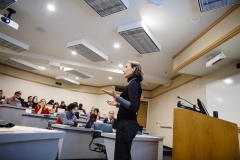Middlebury Institute Posts Strongest Showing Yet at Cyber Competitions
| by Caitlin Fillmore
For the first time, the Institute fielded not one, but three teams, two of which reached the semifinals of the competitive international Cyber 9/12 cybersecurity competitions.





